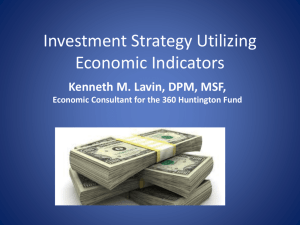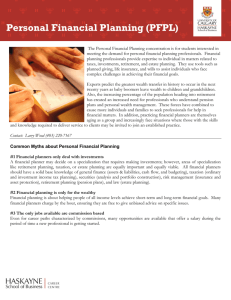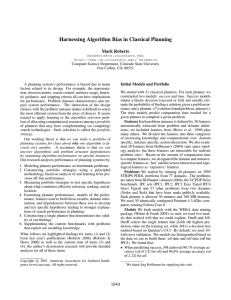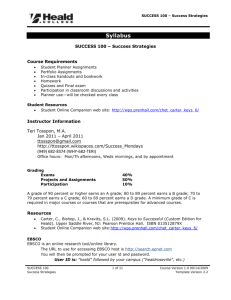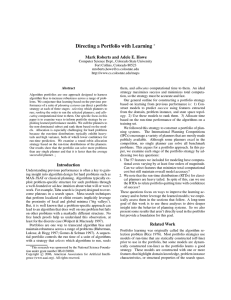The Hidden Value Of Great Financial Planning Financial
advertisement
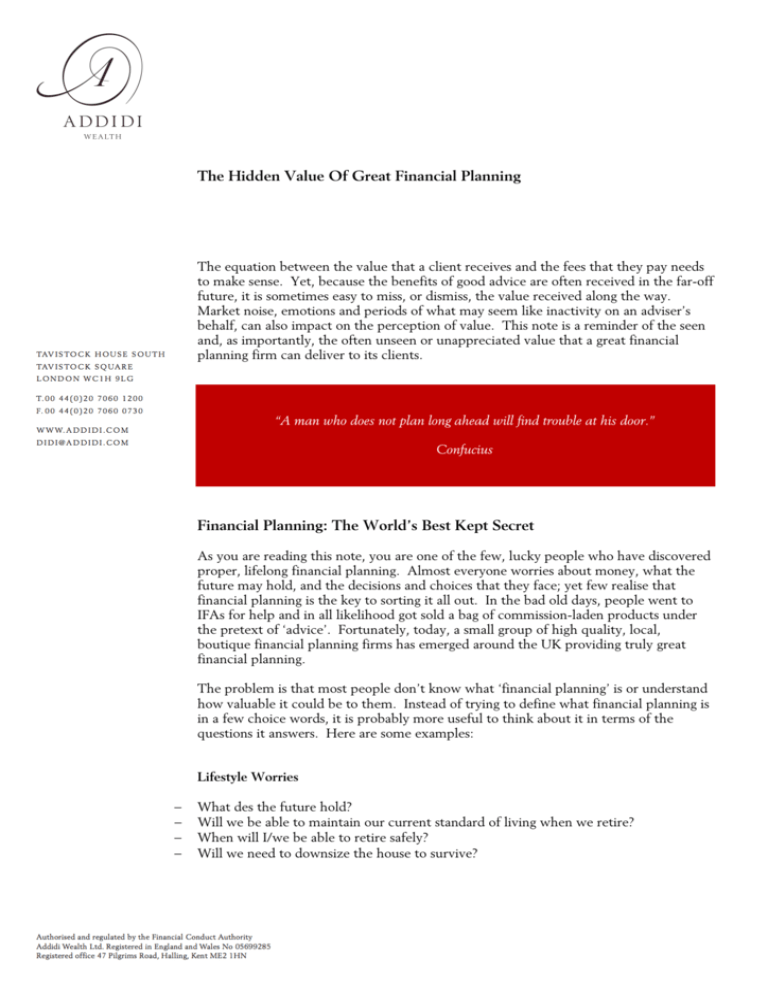
The Hidden Value Of Great Financial Planning The equation between the value that a client receives and the fees that they pay needs to make sense. Yet, because the benefits of good advice are often received in the far-off future, it is sometimes easy to miss, or dismiss, the value received along the way. Market noise, emotions and periods of what may seem like inactivity on an adviser’s behalf, can also impact on the perception of value. This note is a reminder of the seen and, as importantly, the often unseen or unappreciated value that a great financial planning firm can deliver to its clients. “A man who does not plan long ahead will find trouble at his door.” Confucius Financial Planning: The World’s Best Kept Secret As you are reading this note, you are one of the few, lucky people who have discovered proper, lifelong financial planning. Almost everyone worries about money, what the future may hold, and the decisions and choices that they face; yet few realise that financial planning is the key to sorting it all out. In the bad old days, people went to IFAs for help and in all likelihood got sold a bag of commission-laden products under the pretext of ‘advice’. Fortunately, today, a small group of high quality, local, boutique financial planning firms has emerged around the UK providing truly great financial planning. The problem is that most people don’t know what ‘financial planning’ is or understand how valuable it could be to them. Instead of trying to define what financial planning is in a few choice words, it is probably more useful to think about it in terms of the questions it answers. Here are some examples: Lifestyle Worries − − − − What des the future hold? Will we be able to maintain our current standard of living when we retire? When will I/we be able to retire safely? Will we need to downsize the house to survive? Money Worries − − − How much is enough? Will we run out of money? Can we manage financial if one or both of us needs long-term care? Money And Life Challenges − − − What happens to my partner if I die? Will they be alright? What happens if the markets deliver really poor returns? How can we help out the children and grandchildren? Good financial planning helps to resolve these kinds of questions. It helps people feel confident that they have the financial flexibility to survive whatever life and the markets may throw at them. It is also comforting for them to know that they have a trusted finance professional on hand, who intimately understands their family’s circumstances and goals, and who will monitor their finances over time and help them to make the tough decisions that they will inevitably face along the way. That’s the true value of financial planning. Cash flow models, sensibly structured portfolios, tax efficiency and contingency planning are simply the tools that experienced planners use to help them to build and maintain the working plan. In exchange for the financial planning service, clients pay an annual fee. It is often easy to appreciate the value received in the first year, and easy to forget or appreciate the value on an ongoing basis. The financial planning relationship can be broken down into three key phases of value. Value Phase 1: Sorting Out The Mess And Building The Plan New clients often arrive with a proverbial suitcase of bits and pieces collected over the years, such as a number of pension plans, with-profits bonds, endowment policies, life insurance and a stock broker or IFA managed portfolio. They invariably have concerns about what the future holds, and have a strong desire to get their finances in order. Some do not have a clear vision of what they want their future to look like, whilst others lack the confidence that the suitcase full of products will get them there. That’s a stressful place to be. The first and most vital step is to help clients to set out their vision for the future, both in terms of lifestyle goals and the money needed to fund them. Understanding how important it is that they are achieved is critical. Next comes the analytical work, which may involve using cash flow modelling tools to gauge the magnitude of the gap between the client’s vision and the financial reality (or to plan a range of possible scenarios). In some cases, the two may be close. In others the gap may be wide. For some this may mean tough choices: saving more, retiring later, downsizing the house or leaving less for the children. For others, this might mean the chance of actually spending more, gifting money early or pursuing philanthropic interests. Empowering clients to make sensible choices is the objective of the planning process. The resulting ‘plan for the future’ becomes a joint effort between client and planner. The overall strategy is agreed and recommendations are made to reposition the affairs of the client, potentially across a broad range of areas including asset location, investments, tax, wills and contingency planning. Once sorted, the client is then back in control of their future and their finances. The actual implementation can be complex, detailed and time consuming for the financial planning team, as dealing with product companies can be a tortuous process! The value received is easy to see and even sometimes quantifiable, such as the measurable benefits of restructuring to reduce IHT liabilities, other taxes or reducing costs. Value Phase 2: Plan Progress And Progressing The Plan Financial planning is not a ‘set-and-forget’ process, far from it, in fact. Regular review meetings help to provide clients with an insight into how things are going relative to the plan. They are also an opportunity for the client to raise issues or discuss changes to their circumstances, and for the financial planner to raise concerns about the progress of the plan and if there are any decisions that need to be made or actions taken. Reviewing past progress is important, but backward looking. What is more important is the future and how the plan needs to progress from this point forward. Some issues and consequent decisions faced may relate to events in the client’s life, or may be more technical issues that sit in the financial planner’s bailiwick. The latter may relate to things like new investment products, refinements to the longterm portfolio strategy (remember that the true value when it comes to investing lies not just in the initial structuring of a robust portfolio, but the adviser’s role as a foil to avoid the truly dangerous combination of investor emotions and bad, yet often tempting, investment ideas), or changes in pension or tax law. On some occasions, there will be little new to report, but that does not mean that no value was received: the financial planner is out there reviewing, analysing and interpreting a wide range of different issues and challenges on the client’s behalf. Clients have better things to be doing with their time! Over the many years that a client maintains a professional relationship with a financial planning firm, some may be quite uneventful, but they can always be confident that they remain on track and that their adviser has his or her eyes and ears open to issues that may affect them or are of concern and need to be flagged. There will be times when events are momentous, either in the client’s life (divorce, ill-health, an unexpected inheritance or triplets) or in the planner’s world (the markets falling precipitously, as they will do from time to time, or the Chancellor’s new pension regime, for example). Understanding the issues faced, finding a solution that makes sense, facilitating decisions that need to be made and having the fortitude to execute under pressure, is where great financial planners come into their own. Value Phase 3: Long Life, Death And Immortality There are also some more subtle areas of the value of a long-term relationship with a trusted financial planner. For many people, living longer is a two-edged sword. On the upside, we can all now expect to live materially longer than our grand parents’ generation. In fact it has been estimated by the Office for National Statistics that 8% of men and 14% of women age 65 today are projected to live to 100. On the downside, we also know that with longevity comes attendant health problems, not least the rise in dementia. It is a very distressing and worrying time when someone falls ill and often many life and financial decisions need to be made at this difficult time. A financial planner, who has arranged for powers of attorney to be prepared long before they are needed, and who knows the family and their financial circumstances well, is well-placed to provide advice, support and to facilitate the financial consequences of the new change in circumstance at these stressful times. Many clients, often one of a couple who takes more interest in the finances than the other, worry about what will happen to their partner on their death. Having a trusted financial planner (and an up-to-date plan), allows them to be confident that, in the event of their death, their partner will be well cared for financially and that their affairs are in order. Probate too, is a far easier process when everything is organised. Most people would like to feel that they will, in some way, leave behind a lasting legacy. For some, that can mean spending time and money supporting their philanthropic works and for others it may mean passing on wealth from one generation to the next. The proposed 2015 legislation has created an opportunity to pass on wealth to future generations in a tax effective manner, for example. Again, financial planners can play an important role in helping clients to make decisions surrounding such issues. Conclusion It is easy to forget when you meet with your financial planner for your annual review meeting that the scope and value of the relationship is far deeper and more important than worrying about the 12-month market noise that has resulted in your portfolio going up and down, or the fact that neither your portfolio nor the plan has changed much. Meeting your goals, feeling confident in the future and having the time to enjoy the opportunities that your money provides you, your family and your community are what really matter. Delivering ‘peace of mind’ may sound a bit trite, but that is the goal, consequence and value of great financial planning. Other Notes And Risk Warnings This article is distributed for educational purposes and should not be considered investment advice or an offer of any security for sale. This article contains the opinions of the author but not necessarily the Firm and does not represent a recommendation of any particular security, strategy or investment product. Information contained herein has been obtained from sources believed to be reliable, but is not guaranteed. Past performance is not indicative of future results and no representation is made that the stated results will be replicated. Errors and omissions excepted. Addidi Wealth Ltd is authorised and regulated in the United Kingdom by the Financial Conduct Authority (FCA) FRN: 459672, is registered in England and Wales under Company No. 05699285. The registered office address of the Firm is: 47 Pilgrims Road, Halling, Kent ME2 1HN







